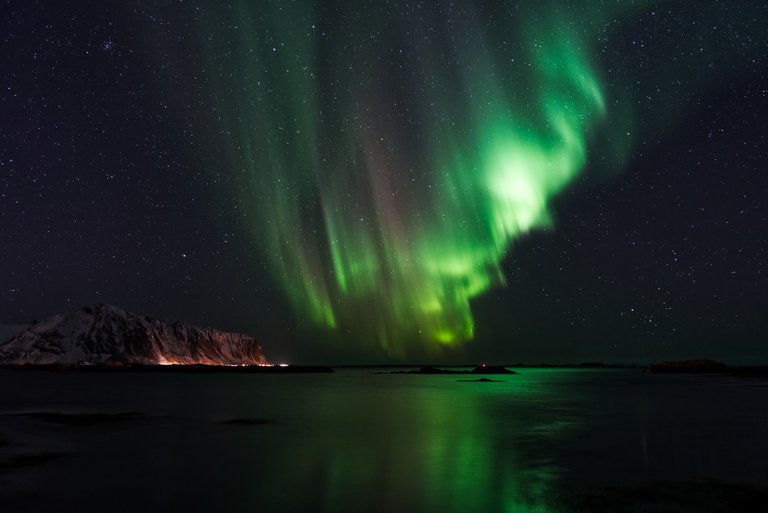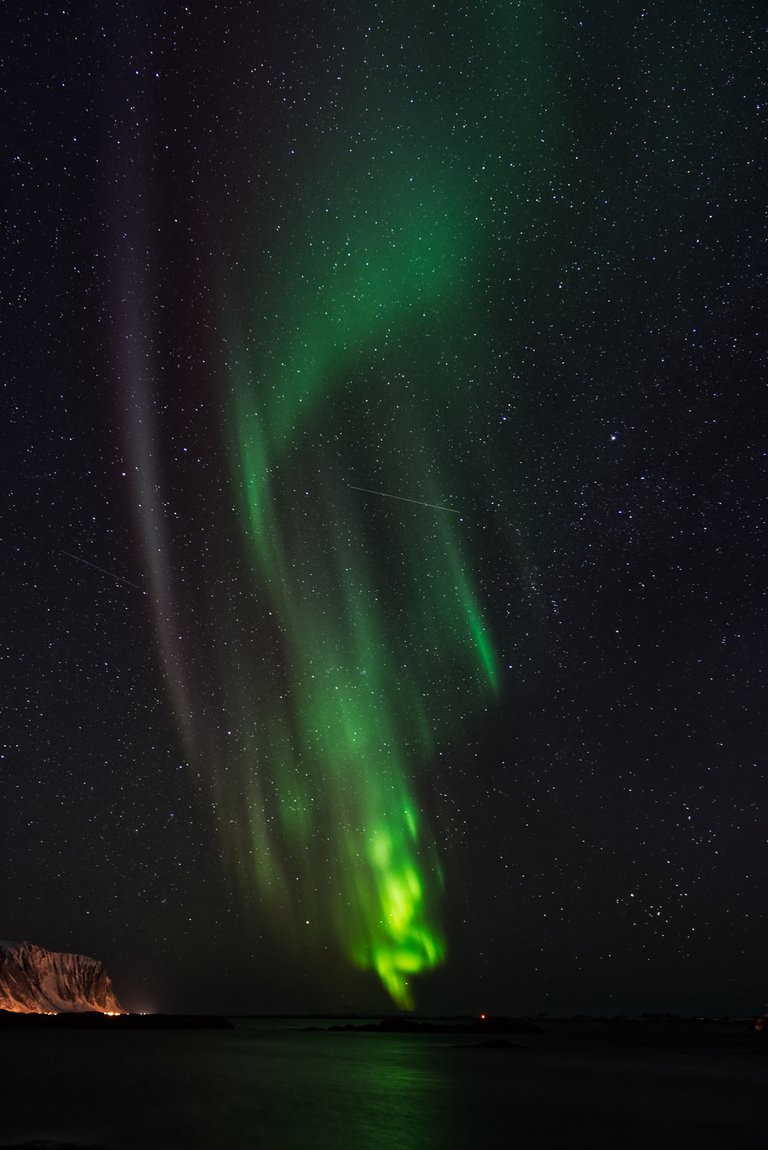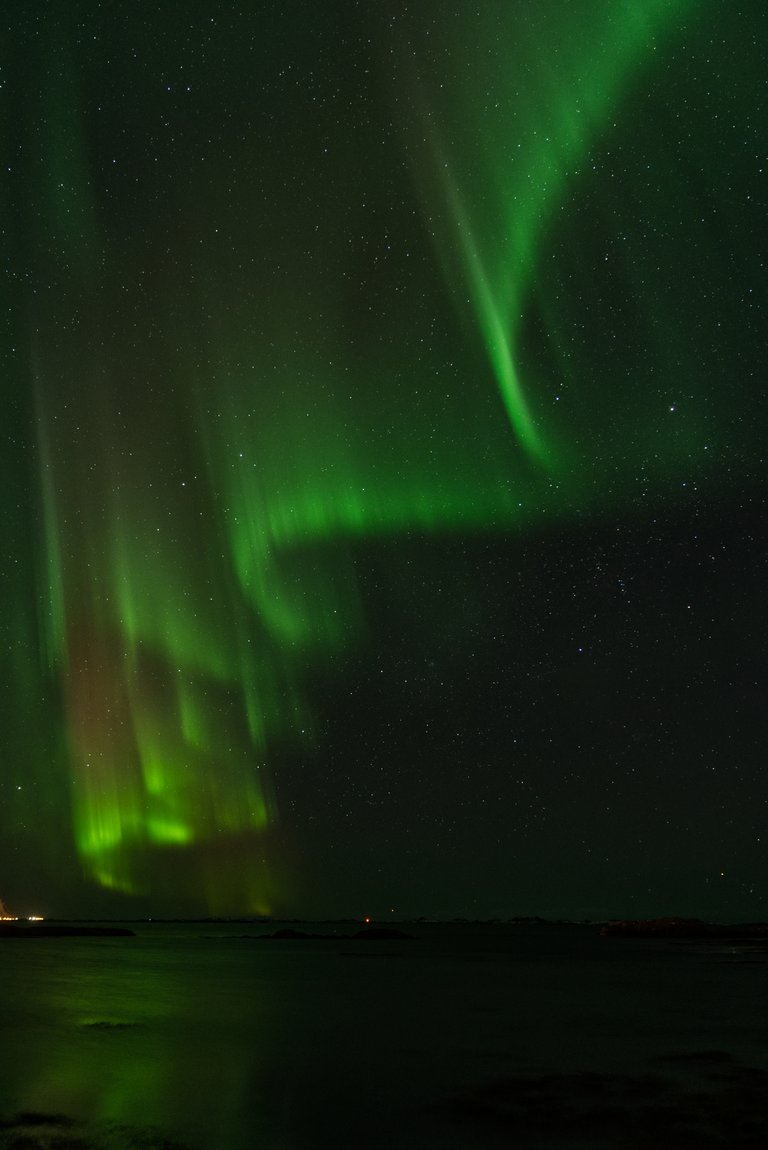Aurora borealis - A dancing beauty
Molecular oxygen (O2) gives typical green colors of aurora borealis.
In low atmosphere oxygen is only molecular.
We breathe only molecular oxygen.
Over 100 km of altitude (heterosphere) you can find also atomic oxygen (O2) created by photolysis effect (O2 molecule is divided in two oxygen atoms due to ultraviolet solar radiation).
Atomic oxygen, hitting by solar wind radiation (electrons and protons at a speed between 200 and 900 Km/s), creates the rare red colors of aurora (it is why you see sometimes red colors above the green colors).

There are also nitrogen (highest percentage) and nitric oxide in atmosphere, and they give respectively blues color and magenta/pink color. Magenta/pink auroras is extremely rare and it happens when solar wind has a highest energy and it reaches the low zone of atmosphere, where the percentage of nitric oxide is higher.

I think to be under an aurora is the most beautiful and amazing show nature can offer. I felt a sort of spiritual presence, the feeling that all this beauty can't be originated by a random interaction between radiation and matter, but there was a sort of intelligence behind this dance, a superior harmony, and my rule was to be the eyes and the conscience able to appreciate all these. I was the eye of an invisible creator, and I forgot cold temperature, anxiety and worries of our daily life.
Here auroras dancing, like a long sheet moved by the breeze:


Some technical notes: I used a Sony tele 24-70 F2.8 on a tripod (always F2,8, sometimes F3.2), iso between 640 and 3200 (usually 1600-2000), where lights was stronger, I set 2 or 3 seconds, when light was weaker, time between 20 and 30 seconds (over 20 seconds you can have a bit of stars trail, but not a problem). About focus I set it to 15 meters (only 24mm, not with higher focals), and I all things had the right focus between 15 meters and infinite (thanks to hyperfocal). Stabilization off, and a two seconds delay to avoid vibrations resulting from the finger pressing the shutter button.
Just a curiosity: I have used white balance in post production, but the green didn't change, because the green of aurora has specific frequency (557,7 nm) that is the frequency of photons emitted by molecular oxygen transition from excited electronic orbital and low regular electronic orbital. It is a pure color, so it can't be changed by white balance change.
Pictures taken with a Sony Alpha 7iii camera.
Vestersand, Vestvågøy island, Lofoten, Norway. On background Eggum cape.
Night between 28 and 29 march 2024.
That aurora seems so cool, once in life should be a must to see
Yes, you need to see it just once in life!
There are some terms that seem weird to me here, lol
I learnt a few things though
good! A have learnt many things about aurora me too
demasiado bello , pero no se compara con el eclipse que vi hoy..
Eclipse has been amazing! I have seen it on Tv, in Italy was night.
Simply spectacular, all a well harmonised play of light.
!discovery 30
Thank you!
This post was shared and voted inside the discord by the curators team of discovery-it
Join our Community and follow our Curation Trail
Discovery-it is also a Witness, vote for us here
Delegate to us for passive income. Check our 80% fee-back Program
Thank you!
This is so cool ☺️ wow awesome 😲
Thank you!
Congratulations, your post has been added to Pinmapple! 🎉🥳🍍
Did you know you have your own profile map?
And every post has their own map too!
Want to have your post on the map too?
So amazing bro 😘
Thank you bro!
This is chemistry, the science of life and it's really so amazing how Nature gives us all of these beauties to enjoy.
This is so beautiful @barnabo73.
https://twitter.com/lee19389/status/1778529773771481392
#hive #posh
These photos are beautiful. Perhaps you are absolutely right when you write that the Northern Lights are the most beautiful spectacle that nature can give us
Grazie!